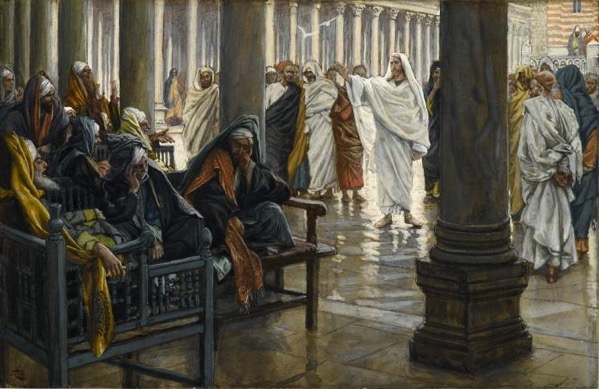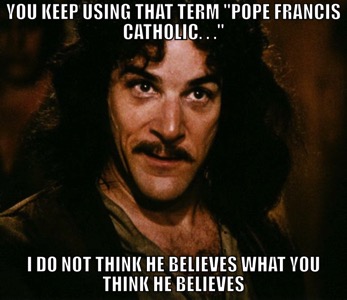These are fundamental principles: No matter what the Christian does, even in the realm of temporal goods, he cannot ignore the super natural good. Rather, according to the dictates of Christian philosophy, he must order all things to the ultimate end, namely, the Highest Good. All his actions, insofar as they are morally either good or bad (that is to say, whether they agree or disagree with the natural and divine law), are subject to the judgment and judicial office of the Church.
—St. Pius X, Singulari Quadam [#3]
Some men, indeed do not attack the truth wilfully, but work in heedless disregard of it. They act as though God had given us intellects for some purpose other than the pursuit and attainment of truth.
—St. John XXIII, Ad Petri Cathedram [#17]
Introduction
Are we willing to live as the Church teaches, regardless of the cost to ourselves? Or will we look at Church teaching to find loopholes that let us do as we will?
If we believe that the Catholic Church is the Church Our Lord created, then it follows that the Catholic Church teaches with His authority. So not listening to the teaching of the Church is not listening to God’s command. This is a reality which is easier to apply to somebody else than it is when we have to obey it ourselves. That’s why I think if we want to encourage people to listen to the Church in great matters, we should listen to the Church on small matters. I don’t mean that in a pharisaical sense of legalism. I mean it in the sense of practicing what we preach. If we grumble at the bishops over relatively minor matters, why should they listen when it comes to harder teachings of morality? In other words, we should live as the Church teaches, testifying that we obey her because we believe God is with her and protects her.
This would be easier if we weren’t affected by original sin. What we want and what God calls us to be are sometimes far apart. This is true in our personal life and social interactions with others. When we want something at odds with what the Church teaches, it’s easy to rationalize playing the Pharisee who uses the letter of the law to avoid the spirit that inconveniences us.
Living as the Church Teaches Means Learning What the Church Teaches
Since our Church has the right and responsibility in determining the right and wrong of our actions, we should seek to understand what she intends in her teachings, not what meaning we can wrest to our own benefit. When the Church teaches we cannot do X, we must not try to find loopholes to evade this command. That’s especially important in an election year. Politicians openly advocate things the Church calls evil. No political party is God’s party. Each fails in some way, and our task is to seek the true good and limit evil when we vote, and speak out when our elected officials choose evil.
The problem is, there are many possible ways to follow Church teaching in the temporal world and we can disagree with each other in some ways without violating Church teaching. There are also acts which violate Church teaching, but people appeal to a false sense of compassion that treats accepting the sin as if it were the same thing as forgiving the sinner. We must avoid condemning the person who obeys the Church but reaches a different plan on the best way to follow. We must also avoid treating disobedience as obedience.
On Abortion: Living as the Church Teaches in a Controversial Election Year
Take the obligation of defending life. The Church makes it clear that abortion is an unspeakable crime that kills an unborn child. No doubt some women are in dire straits and think this is their only choice. We’re called to help those women whether there are government programs or not. But whether or not there are government programs, that does not change the fact that abortion is incompatible with living as the Church teaches and we must oppose it even when we help those women in need.
Our actions in voting and in helping others must reflect the Church teaching that abortion is evil we must oppose. We may not be successful in reversing the legality in a particular four year cycle, but we have the obligation to at least try to limit it (see Evangelium Vitae #73 ¶3) and make it clear to others that, as Christians, we must oppose abortion as a moral evil. We can’t just hope a vote for a pro-abortion candidate will result in more liberal healthcare and a stronger economy so fewer will seek abortions. We must oppose unjust laws that promote it.
As I said earlier, this is easier to apply to others than to ourselves. The teaching of the Church in this area will affect some people more directly than others. If we must defend the good and oppose evil, we can’t support a pro-abortion candidate without a proportionate reason. This will be more of a hardship for a Catholic who supports that candidate or party for other reasons than it will be for one who disagrees with them. That doesn’t mean we must cast our vote for the other major party if they are loathsome to us. If one party supports intrinsic evil and our conscience will not let us support the other major party, we can choose a minor party or write-in to avoid violating what conscience forbids [†].
Living as the Church Teaches Means No Evasions
We can’t seek to evade the teaching of the Church by redefining the issue. That would be like the Pharisees declaring their property qorbon (see Mark 7:10-13) to avoid their obligation to care for their aging parents. For example, one popular tactic is to declare that neither candidate is pro-life, so we are free to choose the pro-abortion candidate on the basis of other issues. The problem is, one has to prove the assertion. We can’t just use it as a proof to justify what we want to do [§]. A Catholic may like the other unrelated policies of a pro-abortion party. A Catholic may loathe other unrelated policies of a party with a platform opposing abortion. But we have to look at the party platforms in terms of what intrinsic evils they support and how that compares to our obligation to live and witness as God commands.
As I mentioned earlier, Catholics who are faithful to the Church can prefer different ways of fulfilling her teachings without sin. Some believe that voting for government programs is part of the obligation of charity. Others believe that these policies cause more harm than help and look for other solutions. So long as neither Catholic is trying to evade their moral obligation, one Catholic does not sin by rejecting the other’s solution. So, to claim that a pro-abortion candidate is the only pro-life choice because he supports social policy that the Catholic hopes will raise the standard of living is false. Likewise, claiming the candidate who opposes abortion is not pro-life either because he opposes those social policies is false.
The reason this is false (though I have no doubt that many Catholics sincerely believe it) is it redefines the right to life to make it meaningless. If we’re talking about abortion, then the candidate’s stance on abortion is relevant. If we’re talking about social justice, then the candidate’s stance on social justice is relevant. But we can’t compare apples and oranges by comparing abortion and social justice and arguing who is lying about their position.
Avoiding Misuse of the Term “Pro-Life”
That argument is a quagmire because the concept of being “Pro-Life” has become a slogan to support or target a candidate in relation to Church teaching. Depending on the political slant, Catholics interpret it broadly or narrowly, but always in their favor. It is more of a colloquial term. In Church documents, it does not appear before the pontificate of St. John Paul II and is usually used in Church documents to describe the defense of life from attack. To understand the term “Pro-life,” we first have to understand that the term appeared in describing the opposition to the “Culture of Death."
The Culture of Death is always described with reference to abortion and euthanasia. This ideology views some life as having less value than other life, and treating some people as less than human. The Church calls things like abortion, contraception, sterilization, population control, attacks on the structure of the family, and euthanasia part of the culture of death. One can say that the culture of death prizes the rights of the individual or small groups, or idolizes the whole nation at the expense of others.
In contrast, the Church presents the family as culture of life and the way to challenge the culture of death (see Centesimus Annus 39). This culture of life welcomes and supports life from conception to natural death. We must oppose the kind of individualism or ideology that puts the self or the nation above the family. Likewise, we must reject policies which either mandate these things or make them seem like the only choice for desperate people. So, yes, we do have to see whether a policy will leave a woman believing she has no choice but to have an abortion as part of being pro-life. If a government fails here, then we have the obligation to help them. We must be pro-life in this area even if the government is not.
But where some Catholics go wrong is that their decision to vote for a pro-abortion candidate (for other reasons) seems to put limits on the Catholic Church emphatically condemning abortion as an unspeakable crime. They always manage to justify a vote for these candidates. What gets forgotten is a Catholic cannot support a candidate or party which defends abortion as a right unless they have a proportionate reason that outweighs the evil this party causes in supporting the culture of death. To do so simply contradicts our obligation to defend the family and all human life.
The Church on Unjust Laws
Which brings us to another obligation. The Apostles testified from the beginning that we must obey God, rather than men (Acts 5:29) when men make laws that go against God. The Catechism tells us:
2242 The citizen is obliged in conscience not to follow the directives of civil authorities when they are contrary to the demands of the moral order, to the fundamental rights of persons or the teachings of the Gospel. Refusing obedience to civil authorities, when their demands are contrary to those of an upright conscience, finds its justification in the distinction between serving God and serving the political community. “Render therefore to Caesar the things that are Caesar’s, and to God the things that are God’s.” “We must obey God rather than men”:49 (1903; 2313; 450; 1901)
When citizens are under the oppression of a public authority which oversteps its competence, they should still not refuse to give or to do what is objectively demanded of them by the common good; but it is legitimate for them to defend their own rights and those of their fellow citizens against the abuse of this authority within the limits of the natural law and the Law of the Gospel.
If we know that a politician or party will abuse their authority and pass laws that violate God’s commands, do we not have the responsibility to block them from taking office by voting against them? If a political agenda is hell-bent on glorifying the culture of death and forcing our compliance (such as supporting abortion and contraception by our taxes), and we will have to refuse obedience, we need to ask why we don’t try to stop them before it gets to that point?
Conclusion
What makes the 2016 elections particularly hard is that both major candidates are loathsome in terms of supporting intrinsic evil in different ways, but one of them will be President. That means a Catholic has to decide how to limit evil for the next four years. Since the Church has made clear that the right to life is the most fundamental right, and that things which violate that right are the worst in the eyes of God, we cannot vote in a way that gives an intrinsic evil free rein without a proportionate reason—something which is not an opinion or preference, but is opposing an objective evil that is more evil than abortion.
Each Catholic will have to decide what their conscience obliges them to do. This obligation means we must seek understanding on how Church teaching applies to voting this year. Eventually, each of us will have to give an account to God—who knows our hearts—on whether we truly sought to do His will or whether we sought to do our will.
Being a member of the laity, my writing on this blog can't compel obedience. All I can do is ask the reader to consider these moral obligations to seek the truth and follow it according to the teaching of the Church. I also ask that you, the reader, pray for this country that each of us may be open to hear God’s guidance in seeking His will.
________________________________
[†] We need to remember that a Catholic who votes for a minor party or write in because his conscience forbids him from voting for either major party is not voting for the other major party. In this case, the Catholic does not will the benefit to the other major party. He acts to avoid what seems to be sinful to him.
[§] That’s a logical fallacy called “Begging the Question."






